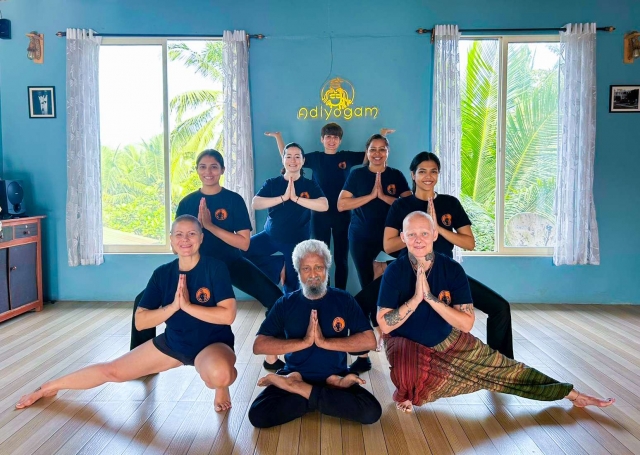Yoga teachers or yoga enthusiasts who want to take up yoga teaching as a professional pathway often find themselves at crossroads when they have to choose an appropriate certification body to gain credibility and recognition for their skills. When it comes to certification, two major names come up - The Yoga Alliance and YCB, that is Yoga Certification Board. While both these institutions offer reliable certifications, they attract and adhere to different audiences and uphold different standards of training as well as practice. Whether you're wanting to expand your yoga skills by seeking a government-recognized credential in India, or you're aiming to become a global yoga instructor, it is important to understand the key differences of the two, what they offer, and how you can benefit so that you can make an informed decision.
What is Yoga Alliance?
The Yoga Alliance is a non-profit organization based in the US that sets globally recognized standards for yoga teacher training courses. It was established in the year 1999, and it offers registered yoga teacher RYT credentials that are based on the number of hours that the student has been trained. For example, RYT 50, RYT 200, RYT 300, RYT 500. The Yoga Alliance, as an organization, does not conduct its own teacher training, but it maintains a registry of the registered yoga schools (RYS) that follow the curriculum guidelines provided by the Yoga Alliance. Upon the successful completion of the training at a yoga alliance-certified yoga school, the yoga teachers get to register with the Yoga Alliance and can have access to a teaching community at the international level. Yoga Alliance certification is like a crash course that even YCB students do to hone their skills within a short period of time, especially professional skills that are required as able teachers.
Key features of Yoga Alliance Certification
- Global recognition – One of the most distinct features about the Yoga Alliance Certification is that its recognition is globally accepted in countries like the US, UK, Australia, Canada, and many more, giving you the chance to share your knowledge and grow professionally in the country of your choice and convenience.
- Online directory – The yoga teachers who are registered with the Yoga Alliance are mentioned in their online directory, meaning that they are listed online for international exposure.
- Continuing education – The members of the Yoga Alliance are encouraged to continue their education further through the Continuing Education (CE) credits of the alliance.
- No exam required – The certification provided by the Yoga Alliance is based on the completion of the course and the evaluation of the trainers, and no exams as such are required to pass the courses to gain credibility.
What is YCB
The YCB or the Yoga Certification Board has been established by the Ministry of AYUSH (Ayurveda, Yoga and Naturopathy, Unani, Siddha and Homeopathy), Government of India in the year 2018 under the aegis of the Government of India as its larger goal to standardize the education of yoga. The YCB offers structured certifications that are in line with the traditional roots of yoga in India. The YCB undertakes exams at national levels through accredited centers and measures the candidates through the medium of practicals, written examinations, and viva. Its certifications range from Yoga Volunteer to Level three Master Yoga Teacher and even Yoga Evaluator.
Key Features of YCB
- Recognized by the government - The YCB certification is officially recognized by the government of India, Indian institutions, and other government bodies.
- Standardized tests – Unlike the yoga lines, the students under YCB have to go through standardized testing and pass the theoretical as well as practical exams.
- Employment opportunities for AYUSH – The YCB certification offers employment opportunities under AYUSH for teaching in institutions, schools, as well as government wellness programs.
- Emphasis on yogic philosophy & Sanskrit – This certification lays strong emphasis on the ancient Indian yoga text, yogic philosophy, Sanskrit, and traditional yogic practices.
Comparison of curriculum
|
Criteria |
Yoga Alliance |
YCB |
|
Hours of teaching |
200/ 300/ 500 hours of teaching format |
Based on levels (Yoga Volunteer, Yoga protocol Instructor, Level three Master Yoga Teacher, Yoga Evaluator) |
|
Exams |
No standardized exams, only some internal assessments by the trainers are required. |
Compulsory written, oral as well and practical exams. |
|
Language |
Mostly English. |
English, Hindi and other Indian languages. |
|
Focus areas |
Yoga postures, teaching methodology and anatomy and philosophy of yoga. |
Emphasis on yoga therapy, Indian philosophy, Sanskrit, and social health aspects. |
|
Mode of teaching |
Both online and offline modes of teaching are available. |
Mostly done offline, only limited pilot programs are available online. |
Career opportunities
For Yoga Alliance
- Students trained under the recognized under the Yoga Alliance can go for international teaching jobs, whether it is a retreat centre in Bali, a yoga studio in Manhattan, or yoga courses Goa India.
- Yoga lines certification is recognized globally on major online platforms, which gives the yoga teachers an edge in excelling professionally from the comfort of their home or personal studio.
- The plus point of Yoga Alliance in terms of career opportunity is that it helps build a global personal brand for yoga teachers and freelancers.
For YCB
- The YCB certification is preferred for jobs in India, especially the Indian government jobs, educational institutions, as well as Ayurvedic Hospitals in India.
- It presents opportunities in state-run wellness initiatives, schemes for public health, and school yoga programs.
- The YCB certification is compulsory if yoga teachers want to participate in the Common Yoga Protocols on the International Yoga Day events in India.
Cost and accessibility
|
Factor |
Yoga Alliance |
YCB |
|
Training fee |
The training fee can range anywhere between INR 40,000 to 2,00,000, depending upon the location and reputation of the Yoga school. |
The training fee varies from Inr 5000 to 25,000 depending upon the level of training. |
|
Registration cost |
The registration cost is anywhere between $100 - $200 annually for the yoga teachers. |
A very low to moderate exam fee of INR 1000 to 5000 is required. |
|
Renewal requirement |
An annual membership renewal is required for the Yoga Alliance certification. |
The renewable requirement in the YCB varies as some certifications have lifelong validity while some need to be renewed. |
Conclusion
Both the Yoga Alliance and YCB have their unique charms. Choose Yoga Alliance if you want to teach globally and want flexibility in your course and learning options, alongside exploring contemporary styles like Yin yoga, Vinyasa, Aerial, or hot yoga. Choose YCB if you want to resonate deeply with the Indian yogic philosophy and work with the Ayush Wellness Centers and schools, alongside having an affordable and government-backed certification while you approach yoga training from a long-term perspective in India.
Many yoga schools in India like Adiyogam which is based in Arambol, North Goa offers yoga alliance certified yoga teacher training in Goa under the guidance of traditional yoga masters like Bharat Ram who has grown up living yoga the traditional way and holds decades of experience In guiding students in yoga alliance certified courses which have global recognition and will help you explore yoga as a global wellness business alongside gaining benefits of the ancient yogic knowledge.






